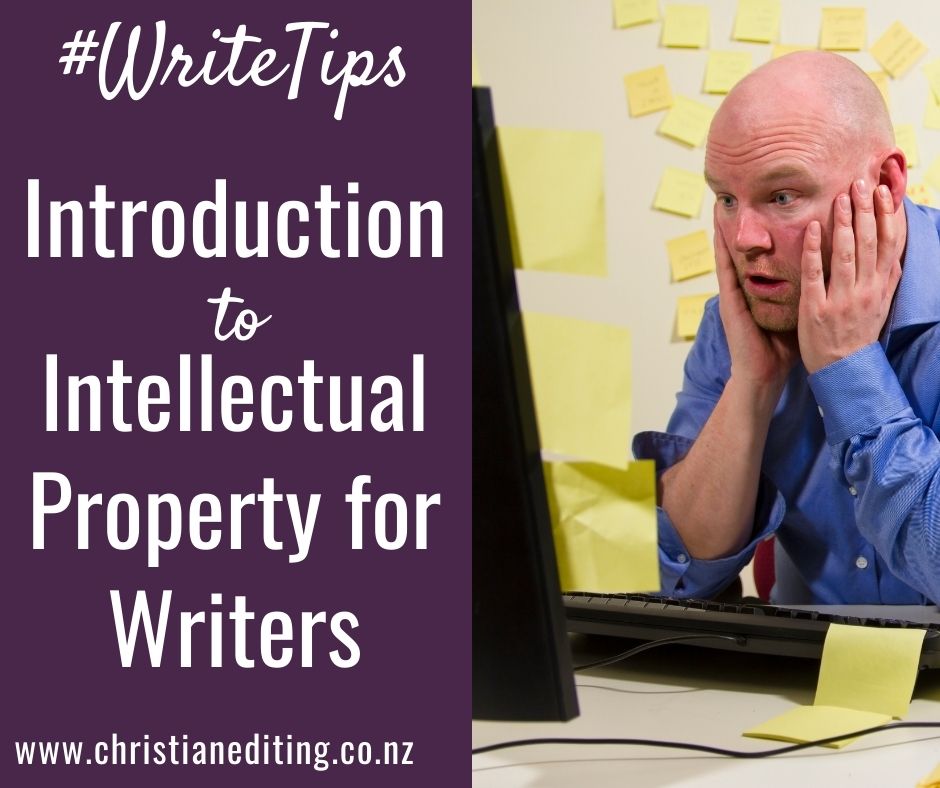As content creators, we need to understand the basics of intellectual property law, particularly copyright. This post covers the basics of copyright for authors, and links to my more in-depth posts on the topic.
Please note that I am not a lawyer, and this is not legal advice. There is a lot of great information about copyright on the internet, but none of it is legal advice. To get legal advice, you pay a lawyer licensed to practice in your state or country.
Intellectual property (IP) is that branch of property law that covers creations of the mind, including books, articles, blog posts and other written works. These are forms of property just like a house or a car, and intellectual property law seeks to protect the rights of IP creators.
Property can be a physical asset (like a house or a car or a computer), or intellectual. The World Intellectual Property Organisation (part of the United Nations) divides intellectual property into five categories:
- Copyright (e.g. ownership of a book, a photograph, a song, or a blog post).
- Trademark (e.g. a logo or brand that is associated with a product e.g. an Apple computer or a McDonalds burger).
- Patents (e.g. pharmaceutical products are usually protected by patent).
- Industrial designs.
- Geographic indicators.
Copyright and trademarks are the two which are relevant to authors.
All writers need to understand the basics of intellectual property law for two reasons:
- So they know their rights in regard to the work they write and publish
- So they do not infringe the rights of others
Click here for more information on what copyright covers and who owns copyright.
Why do we have Intellectual Property rights?
Like physical property, intellectual property is something you can own. If you build a table, you own the right to do what you want with that table. Intellectual property rights give you the same rights over your creative works, such as books or blog posts.
Intellectual property rights recognise that individuals and organisations put time and effort into developing their intellectual property. As such, they have a right to benefit from their investment—to have the exclusive right to sell what they’ve made.
Just as we have laws that prohibit people from stealing your table (and ensuring the face consequences if they do), copyright laws help ensure no one steals and sells your work.
As a general rule, you own the copyright on what you write from the moment you write it. You can gain additional protection by registering a published book with the US Copyright Office, even if you’re not from the USA. It costs USD 35, and takes about fifteen minutes.
Note that posting something to yourself (sometimes referred to as “poor man’s copyright’) doesn’t strengthen your claim to the work. You own the copyright from the moment of creation. (Besides, printing and posting a 300-page manuscript to yourself isn’t cheap and could end up costing more than officially registering the copyright. It’s not exactly the “poor man’s” option).
Exception: Work for Hire
If you work for an organisation that employs you to make tables, you don’t own the tables you make. Any table you make at work is the property of your employer, because you are working for hire.
The same holds true for intellectual property. If you’re asked to write a book or write content for a website as part of your job, your employer owns the words you write. If you’re employed to undertake research, your employer owns the results of that research and may choose to protect that by trademark, patent, or another form of intellectual property protection.
What Copyright Doesn’t Protect
Copyright doesn’t protect all creative endeavours. For example, ideas aren’t protected by copyright:
Copyright protects the author’s expression, but not the underlying facts, ideas, or theories, no matter now novel those may be … what counts is not quality or novelty but only that the work be original. (Chicago Manual of Style, 17th edition, 4.5)
Click here to find seven works creators can’t copyright.
Copyright also doesn’t protect patents and trademarks. They are protected by patent and trademark law. Click here to read more about trademarks.
Other Copyright Tips
Copyright is relevant to us in more ways than as writers. For example, images are also subject to copyright. This means we need to be aware of who owns the images we see online, and how we use images in our own work e.g. in blog posts, or cover designs. Click here to read how to use images in blog posts.
There are times when authors and bloggers can use material created by others:
- When the material is not under copyright (e.g. because it’s public domain). Click here to find out more about public domain and permissions.
- When the copyright holder gives permission (e.g. under a Creative Commons licence, or because they are a government entity).
- When the use falls under the doctrine of Fair Use (also known as fair dealing). Click here to find out more about fair use and fair dealing.
You can’t copy a book review on your book without permission, because the reviewer owns the copyright on that review. Click here to read more about book reviews.
You should be careful about “borrowing” a character from another author’s book to include in your own. Click here to read more about borrowing fictional characters.
Even if you don’t need permission (e.g. because the work is public domain), quoting another writer without acknowledging the source is plagiarism, which is a form of fraud.

